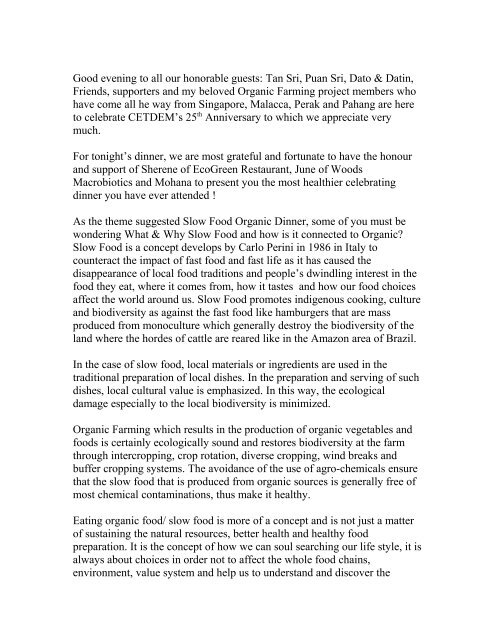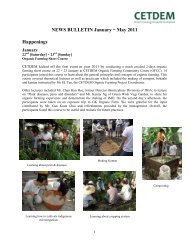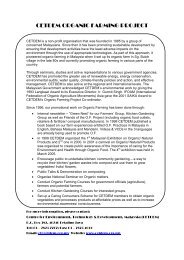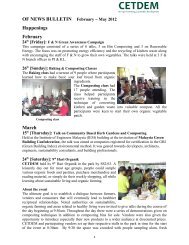Read more: Introduction to Slow Food by Ms Tan Siew Luang - cetdem
Read more: Introduction to Slow Food by Ms Tan Siew Luang - cetdem
Read more: Introduction to Slow Food by Ms Tan Siew Luang - cetdem
- No tags were found...
Create successful ePaper yourself
Turn your PDF publications into a flip-book with our unique Google optimized e-Paper software.
Good evening <strong>to</strong> all our honorable guests: <strong>Tan</strong> Sri, Puan Sri, Da<strong>to</strong> & Datin,Friends, supporters and my beloved Organic Farming project members whohave come all he way from Singapore, Malacca, Perak and Pahang are here<strong>to</strong> celebrate CETDEM’s 25 th Anniversary <strong>to</strong> which we appreciate verymuch.For <strong>to</strong>night’s dinner, we are most grateful and fortunate <strong>to</strong> have the honourand support of Sherene of EcoGreen Restaurant, June of WoodsMacrobiotics and Mohana <strong>to</strong> present you the most healthier celebratingdinner you have ever attended !As the theme suggested <strong>Slow</strong> <strong>Food</strong> Organic Dinner, some of you must bewondering What & Why <strong>Slow</strong> <strong>Food</strong> and how is it connected <strong>to</strong> Organic?<strong>Slow</strong> <strong>Food</strong> is a concept develops <strong>by</strong> Carlo Perini in 1986 in Italy <strong>to</strong>counteract the impact of fast food and fast life as it has caused thedisappearance of local food traditions and people’s dwindling interest in thefood they eat, where it comes from, how it tastes and how our food choicesaffect the world around us. <strong>Slow</strong> <strong>Food</strong> promotes indigenous cooking, cultureand biodiversity as against the fast food like hamburgers that are massproduced from monoculture which generally destroy the biodiversity of theland where the hordes of cattle are reared like in the Amazon area of Brazil.In the case of slow food, local materials or ingredients are used in thetraditional preparation of local dishes. In the preparation and serving of suchdishes, local cultural value is emphasized. In this way, the ecologicaldamage especially <strong>to</strong> the local biodiversity is minimized.Organic Farming which results in the production of organic vegetables andfoods is certainly ecologically sound and res<strong>to</strong>res biodiversity at the farmthrough intercropping, crop rotation, diverse cropping, wind breaks andbuffer cropping systems. The avoidance of the use of agro-chemicals ensurethat the slow food that is produced from organic sources is generally free ofmost chemical contaminations, thus make it healthy.Eating organic food/ slow food is <strong>more</strong> of a concept and is not just a matterof sustaining the natural resources, better health and healthy foodpreparation. It is the concept of how we can soul searching our life style, it isalways about choices in order not <strong>to</strong> affect the whole food chains,environment, value system and help us <strong>to</strong> understand and discover the
essence of how food come <strong>to</strong> the table and the relationship between man andnatureTonight the food that you are eating are all vegetarian base products. For aclimate change perspective, it is logical <strong>to</strong> eat as low down in the foodtriangle since the amount of nutrients; consequently the green house gassesgenerated are much <strong>more</strong> less than the production of the amount of meat.We also hope those who are not regular vegetarian will enjoy this vegetariandinner because we would like <strong>to</strong> share with you that non dairy dishes neednot <strong>to</strong> be plain, tasteless and boring……. Eating is an art so enjoy yourdinner and eat slowly..!Last but not least, may I take this opportunity <strong>to</strong> thank their labour of love ingetting the dishes on the table, the sponsors, donors, the organizingcommittee, volunteers, media and my colleagues in making this dinnerpossible.It is your kind support and generosity always that have kept the flame ofCETDEM’s vision glowing……...**********************************************************In Malaysia a few of us are members of <strong>Slow</strong> <strong>Food</strong> International and haveattended the World <strong>Food</strong> Community Meeting in Northern Italy. A <strong>Slow</strong><strong>Food</strong> Convivium was set up 2 years ago, under the umbrella of CETDEM.Those interested may join as a member of <strong>Slow</strong> <strong>Food</strong> Int. with an annualsubscription euro 5.00.





